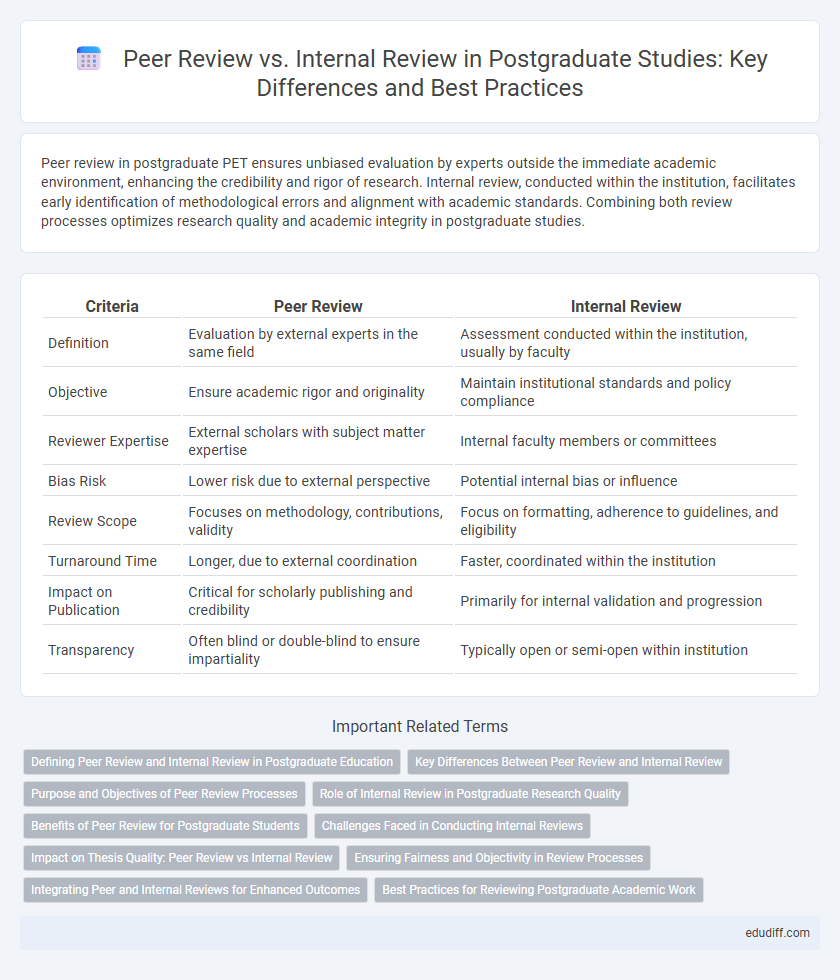Peer review in postgraduate PET ensures unbiased evaluation by experts outside the immediate academic environment, enhancing the credibility and rigor of research. Internal review, conducted within the institution, facilitates early identification of methodological errors and alignment with academic standards. Combining both review processes optimizes research quality and academic integrity in postgraduate studies.
Table of Comparison
| Criteria | Peer Review | Internal Review |
|---|---|---|
| Definition | Evaluation by external experts in the same field | Assessment conducted within the institution, usually by faculty |
| Objective | Ensure academic rigor and originality | Maintain institutional standards and policy compliance |
| Reviewer Expertise | External scholars with subject matter expertise | Internal faculty members or committees |
| Bias Risk | Lower risk due to external perspective | Potential internal bias or influence |
| Review Scope | Focuses on methodology, contributions, validity | Focus on formatting, adherence to guidelines, and eligibility |
| Turnaround Time | Longer, due to external coordination | Faster, coordinated within the institution |
| Impact on Publication | Critical for scholarly publishing and credibility | Primarily for internal validation and progression |
| Transparency | Often blind or double-blind to ensure impartiality | Typically open or semi-open within institution |
Defining Peer Review and Internal Review in Postgraduate Education
Peer review in postgraduate education involves evaluation by subject matter experts from outside the immediate academic institution, ensuring unbiased assessment of research quality and academic rigor. Internal review is conducted within the same institution, focusing on alignment with institutional standards, curriculum relevance, and resource feasibility. Both processes are critical for maintaining academic integrity and enhancing the quality of postgraduate programs.
Key Differences Between Peer Review and Internal Review
Peer review involves evaluation by external experts who assess the validity, originality, and significance of postgraduate research, ensuring unbiased scrutiny and academic rigor. Internal review is conducted within the institution, focusing on adherence to institutional standards, ethical compliance, and alignment with program requirements. Key differences lie in the reviewers' independence, scope of evaluation, and primary objectives, with peer review emphasizing external validation and internal review prioritizing institutional quality control.
Purpose and Objectives of Peer Review Processes
Peer review processes primarily ensure the validity, originality, and quality of academic research by involving independent experts to critically evaluate the study's methodology and findings. The objective is to uphold scholarly standards, prevent the dissemination of flawed or biased work, and provide constructive feedback for improvement. Internal reviews focus more on compliance with institutional policies and ethical standards, serving as an initial quality check before external peer evaluation.
Role of Internal Review in Postgraduate Research Quality
Internal review plays a crucial role in maintaining postgraduate research quality by ensuring compliance with institutional standards and ethical guidelines before external peer review. This process facilitates early detection of methodological flaws, enhances the coherence of research arguments, and supports the development of rigorous academic work. By providing a structured feedback mechanism, internal review strengthens the overall reliability and credibility of postgraduate theses and dissertations.
Benefits of Peer Review for Postgraduate Students
Peer review provides postgraduate students with critical, unbiased feedback from experts in their field, enhancing the rigor and credibility of their research. This process helps identify gaps and improve the quality of their work before publication or submission. Engaging in peer review also fosters academic networking and develops skills essential for future scholarly communication.
Challenges Faced in Conducting Internal Reviews
Conducting internal reviews in postgraduate research often encounters challenges such as potential bias due to familiarity with the work, limited objectivity from reviewers within the same institution, and resource constraints including time and access to diverse expertise. These factors can undermine the rigor and credibility of the review process compared to peer reviews, which involve independent experts with specialized knowledge. Managing confidentiality and ensuring consistent evaluation standards remain critical obstacles in maintaining the quality of internal reviews.
Impact on Thesis Quality: Peer Review vs Internal Review
Peer review enhances thesis quality by incorporating diverse expert perspectives, leading to more rigorous analysis and increased academic credibility. Internal review, conducted within the institution, ensures adherence to specific program standards and institutional guidelines, providing consistency and alignment with curriculum objectives. Combining peer and internal reviews maximizes the thesis's scholarly impact by balancing external validation with internal compliance.
Ensuring Fairness and Objectivity in Review Processes
Peer review involves evaluation of postgraduate research by external experts to ensure unbiased assessment, while internal review is conducted within the institution to verify compliance with academic standards. Both processes prioritize fairness and objectivity by incorporating multiple reviewers and standardized criteria to minimize personal biases. Combining peer and internal reviews strengthens the integrity and credibility of postgraduate evaluation systems.
Integrating Peer and Internal Reviews for Enhanced Outcomes
Integrating peer and internal reviews in postgraduate research enhances the rigor and reliability of academic work by combining diverse expert perspectives with institutional standards. Peer reviews offer critical, field-specific feedback from external scholars that ensures scholarly validity, while internal reviews provide contextual insights aligned with the university's policies and research objectives. This collaborative review process fosters comprehensive quality assurance, strengthens argumentation, and improves the overall impact of postgraduate theses and dissertations.
Best Practices for Reviewing Postgraduate Academic Work
Peer review emphasizes external, unbiased evaluation by subject matter experts to ensure academic rigor and validity, while internal review involves thorough assessment within the institution to align with academic standards and policies. Best practices include establishing clear criteria, maintaining confidentiality, providing constructive and detailed feedback, and ensuring reviewers possess relevant expertise to uphold the quality and integrity of postgraduate theses or dissertations. Consistent use of standardized review rubrics and timely communication enhances the effectiveness of both peer and internal review processes.
Peer Review vs Internal Review Infographic

 edudiff.com
edudiff.com